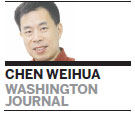
It's rare for mainstream US news media to question their own government over accusations regarding China. So rare, that when it happens, it becomes news.
When Matthew Lee, a reporter with The Associated Press, asked State Department deputy spokesman Mark Toner on Feb 17 whether the US' sending of large military vessels and planes to the South China Sea was militarizing the area, Toner said it did not count as militarization but rather freedom of navigation.
On Feb 18, the same kinds of questions were posed by Lee and other journalists to State Department spokesman John Kirby.
'You can understand that from the Chinese perspective, it raises tensions, no?' Lee asked again about the US sending military planes and vessels to South China Sea.
'It's not militarization, and the Chinese have expressed their concerns about it, but the answer to it is simply that these are…' said Kirby.
'We're right and you're wrong,' Lee retorted.
When Kirby talked about US treaty obligations to its allies in the region, Lee reminded him that it does not cover the area that the treaty allies, such as the Philippines, do not have sovereignty over.
'And unless I'm mistaken, the United States has never ratified the Law of the Sea — the UN Convention on the Law of the Sea,' said Lee.
The bombardment continued. Lee said, 'You're demanding that the Chinese accept your explanation on this, just as you demand that other countries, like Russia, demand — accept your explanation for NATO moving towards the East as not being a threat. But they perceive it as such, and that — and because they perceive it as such, that raises tensions.'
'So let's talk about those tensions we're talking about. And I think it's great that you feel comfortable speaking for the Chinese government. I don't, so I won't, I won't, I won't,' said Kirby, who looked clearly at wit's end after recycling State Department talking points time and again to a dozen rounds of questions on the issue.
'I'm not speaking for the Chinese government,' said Lee, with a laugh.
It was not a first for Lee getting jabbed by State Department spokespersons. Well known for his sharp questions at the State Department daily briefings,Lee was accused in September of 2014 by then spokeswoman Marie Harfof 'buying into the Russian propaganda' when he asked if NATO's decision to set up a rapid reaction force in Eastern Europe was 'provocative'.
The questions on Wednesday and Thursday regarding China were a result of US news reports suggesting that commercial imagery seemed to indicate that China had deployed a surface-to-air missile system on Yongxing Island in the South China Sea.
China has not denied the defense facilities on the island. Hong Lei, China's foreign ministry spokesman, said on Feb 19 that the Chinese government set up administrative offices and later government facilities there in 1959. China has for several decades been carrying out construction and setting up necessary defense facilities there.
'The relevant country and person should know well enough about the historical records and basic facts of the South China Sea before making statements,' he said.
Chinese Foreign Minister Wang Yi told visiting Australian Foreign Minister Julie Bishop in Beijing on Feb 17that demilitarization is in accordance with the interests of all parties, but it should not be implemented by only one country or practiced under double or multiple standards.
'Demilitarization in the South China Sea requires joint efforts from countries both inside and outside the region,' Wang said.
Hong, the spokesman, said on Feb 19 that the current situation is that the US keeps increasing its military presence in the South China Sea. It has been sending military planes and vessels there to conduct close-up military surveillance against China, dispatching missile destroyers and strategic bombers to the airspace and waters near or even inside relevant islands and reefs of China's Nansha Islands, and trying to talk its allies or partners into carrying out highly targeted joint military exercises and patrols in the South China Sea.
'It is those actions, which heighten tensions in the South China Sea, that are militarizing the South China Sea,' Hong said.
Hong did not say that the US is the largest arms dealer in the Asia Pacific region, actions that make the region one of the most militarized in the world.
AP reporter Lee's questions at the State Department have been widely covered by the Chinese news and social media over the past two days. To many Chinese, most US journalists, unlike Lee, would readilybuy into US government propaganda when it comes to disputes between China and the US.
Contact the writer at chenweihua@chinadailyusa.com.